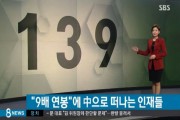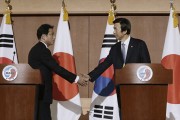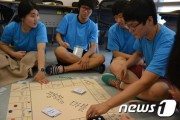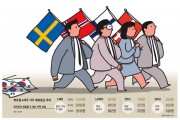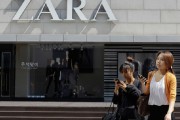From Daum:
9 out of 10 Young Adults Believe ‘Korea is Unfair’
Many young people believe ‘deep-rooted nepotism will ruin society’. Many more young people hold this belief compared to those who are 60 and above; they also think that bureaucratic cartels brought about the Sewol disaster. [Note: nepotism in this article refers to unofficial connections not only between family members]
The Sewol disaster on April 16 was an incident that directly exposed Korean society’s deep-rooted evils such as the backwards safety culture and immoral bureaucratic cartels. The evil that must be skimmed first is the deeply-rooted public ‘nepotism’ stemming from the ‘Ministry of Maritimafia’ (Ministry of Maritime Affairs and Fisheries + Mafia) and ‘Bureacrafia’ (Bureaucrat + Mafia), which are allusions to the Italian mafia. A survey has shown that practices which achieve or overlook certain situations depending on connections exist not only in public society, but also in politics, economics, law, and sports. These practices are said to be turning Korea into an ‘unfair nation’ and ‘factional republic.’
The Segye Times recently collaborated with the Asan Institute for Policy Studies (Director: Jebong Ham) and conducted a one-day analysis beginning with an ‘awareness and understanding of nepotism’ survey targeting 1000 young adult males and females across the country. The results showed that 9 out of 10 young adults, who will become Korea’s next generation of leaders, believe ‘Korean society is influenced by school, regional, family, and personal connections’ and ‘fairness is not possible.’ These response rates were unusually higher than those of the older generation, indicating that measures to establish a fair society are urgently needed.
When asked about the effect of nepotism on social fairness, 78.5% of respondents answered that it resulted in society being ‘not fair’ (not very: 50.0%, not at all: 28.5%). 18.0% said society was ‘fair’ (mostly: 16.0%, very: 2.0%) regardless of nepotism.
As respondents’ ages lowered, more and more of them said that society had become unfair because of nepotism. In particular, 92.8% of people in their 20’s claimed that society is unfair. This number was a surprising 40.1 percentage points higher than the 52.7% of people 60 years or older. The other percentages were 86.7%, 83.4%, and 76.9% for people in their 30’s, 40’s and 50’s, respectively. Director of the Public Opinion Studies Center in Asan Institute for Policy Studies, Kim Jiyoon, said, ‘This seems to reflect the dissatisfaction stemming from anxiety about the future due to the terrible unemployment crisis and the fact that it is difficult to succeed in society through individual efforts or by efforts alone. This is a serious problem, since the young generation, the generation that will carry our country’s future, has an extremely negative perception of fairness.’
The reason why the majority of respondents, including young adults, said society is unfair is because ‘in the past year, they or an acquaintance was disadvantaged due to connections during job hunting, promotion, or business.’ This opinion accounted for 36.9% of responses, which is quite significant.
Those who were disadvantaged claimed that this was mostly caused by ‘school connections’ (self: 52.0%, acquaintance: 55.9%), followed by ‘regional connections’ (27.8%, 28,1%) and ‘family connections’ (11.2%, 10.2%). Many pointed out that a considerable number of officials from the Ministry of Maritime Affairs and Fisheries ship vessel safety department and sailors/engineers from the shipping industry who were involved in the Sewol disaster had graduated from specific colleges, yet did not monitor or control the situation properly.
This survey was conducted via computer interview (CATI) and has a 95-percent confidence level with plus or minus 3.1 percent.

Different types of connections in Korean society, clockwise from top center: emotional, geographic, social, social (related to academics), colleagues, religious, familial, school ties
Comments from Daum:
프로토콜님 (4934 upvotes at the time of translation)
If the world had been fair, the Sewol accident would not have happened!
동글이mm님 (responding to above)
Like I said, we must get rid of public officials’ preferential treatment. There are no examinations which they are not exempt from. Is this the 1970s? Tax accountant exam, lawyer exam, customs exam, firefighting management exam, engineer exam, cultural assets exam, etc. Regular folks have to rack their brains studying for these tests, but if public officials work for a certain period, the first part of the test is exempt. Then the second part is a piece of cake, so they have no worries.
southernstar님 (responding to above)
How about the view that regards the people who demand fairness as uncool people obsessed with politics? If all they do is complain but don’t do anything to change it, who will do it? You can’t always excuse yourself.
stone님 (responding to above)
If you feel that way, vote properly! One shot one kill!! Just take down the stronger party every time you vote! Doesn’t take a lot. Just take down those with the ‘Sae’ [Saenuri Party] character twice and they’ll be trembling in front of the citizens the third time!
PANDA님 (responding to above)
If you cry unfairness, they will call you a lefty or a commie.
하고말꺼야두고봐님 (4616 upvotes at the time of translation)
(2014, The Great Sewol Massacre) The people do not need a president who does not take responsibility for the citizens’ lives. The reason why being the president is difficult is because the responsibility is heavy. The immense authority and high salary, the gourmet meals, private jets, and bodyguards. All of those come with the price tag of responsibility.
hlhk님 (responding to above)
Your method of criticism is really low. ‘The Great Massacre…’ tsk tsk
트럭보이님 (responding to above)
Those with power in the Ruin of Korea [intentional misspelling of 민] don’t care about citizens. They just have power. Ilbe trash, conservative nutjobs, pro-Japanese monkeys, Yankee suck ups… wake the hell up. We can’t go on like this. If we do, our miserable nation will soon be underwater.
keeneye님 (1587 upvotes at the time of translation)
Honestly, I think that asking 60+ year olds about societal fairness is not a good idea because they can’t feel the unfairness. Their standard of morality is different.
선비님 (1347 upvotes at the time of translation)
I can particularly sense that from the Park Geun-hye administration.
kimga님 (1089 upvotes at the time of translation)
Those in their 50’s must not be in their right minds ke ke

